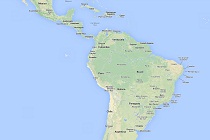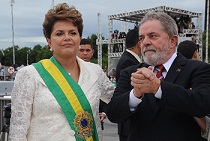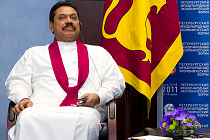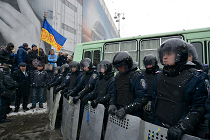Latin America Update, May 2014
In 'Latin America Update' Gateway House lists some of the important events in Latin America over the past month
 Courtesy: Google Maps
Courtesy: Google Maps
In 'Latin America Update' Gateway House lists some of the important events in Latin America over the past month
 Courtesy: Government of Brazil/Wikimedia Commons
Courtesy: Government of Brazil/Wikimedia Commons
Brazil’s advantages – including resources of oil and gas, no historical baggage, an absence of terrorism and military conflicts – and regional leadership, make it a potential global power. But it also has to tackle many challenges in the medium-term, such as poverty, poor infrastructure, healthcare and education
 Courtesy: Alexander Nikiforov/Wikimedia Commons
Courtesy: Alexander Nikiforov/Wikimedia Commons
India abstained from voting on the recent UNHRC resolution on Sri Lanka calling for an international probe into the alleged war crimes committed by the Sri Lankan government. Sri Lanka has the option of rejecting the resolution, but it will have to evolve a strategy keeping in mind India’s concerns
 Courtesy: Google Maps
Courtesy: Google Maps
In 'Latin America Update' Gateway House lists some of the important events in Latin America over the past month
 Courtesy: Wikimedia Commons
Courtesy: Wikimedia Commons
Latin America continues to turn to the Left. Michelle Bachelet became president of Chile in March and has promised fiscal reform; Salvador Sanchez Ceren took over as president of El Salvador in June and will tackle inequality; and in Costa Rica too, the centre-left Luis Guillermo Solis assumed power
Ronen Sen, former Indian Ambassador to Russia and the United States, talks about the global implications of Russia’s suspension from the G8. In an interview to Gateway House, he also discusses the impact of these developments on major geopolitical issues like Iran and Syria
 Courtesy: mac_ivan/Flickr
Courtesy: mac_ivan/Flickr
Crimea will hold a referendum this weekend on secession from Ukraine. The current crisis has brought to the fore Cold War era hostilities. However, an unstable Ukraine is in no one’s interest as it has implications for the region and the EU-Russia trade relationship
Neelam Deo, Director, Gateway House, talks about the potential economic impact of the ongoing crisis in the Ukraine. In this interview, she also examines the aid packages offered to Ukraine by Russia and the West, and assesses how the situation will affect India’s trade relations
R. Viswanathan, Distinguished Fellow, Latin America Studies, Gateway House, has been following the movements in Ukraine and Venezuela closely. In this interview, he explains the parallels and the impact on Venezuela
 Courtesy: alex proimos/Wikimedia Commons
Courtesy: alex proimos/Wikimedia Commons
With a devaluing peso, a low trade surplus, high inflation, and falling foreign exchange reserves, the economic situation in Argentina is bleak. But the government can overcome the crisis by changing policies, lessening controls, exploring the country’s shale gas reserves, and working on settling its debt